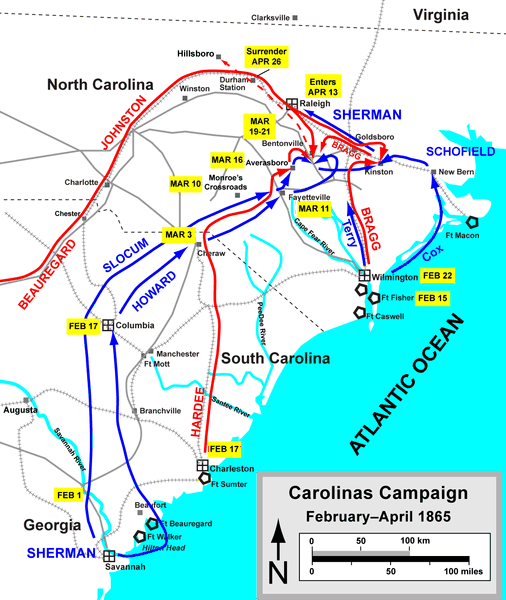War is a part of humanity than involves the loss of life, cruelty, atrocities, and destruction for all involved. What sometimes make such action tolerable is when its purpose is justified, as in the attempt to eradicate slavery and defeat a rebellion founded upon keeping men, women, and children in chains.
While Ulysses S. Grant deservedly gets credit for winning the war for the North, his victory would not have been possible without the efforts of one William Tecumseh Sherman.
Having served under Grant at bloody battles such as Shiloh and Vicksburg, Sherman received command of Union armies in the western theater in early 1864, when the tide of the war had turned and the Confederacy was reeling. It was then up to the friends Grant and Sherman to break the back of the rebels, and that they did with aplomb (at the cost of thousands of lives and damage to the landscape).

Sherman took three armies and 100,000 men and invaded Georgia. In a move that was taken as incredibly foolish by those around him at the time, Sherman cut himself off from his supply lines and communications with superiors. Despite misgivings, Grant and President Lincoln acquiesced to his decision to go it alone. The leash untethered, Sherman let loose a side of war on the South the Confederacy had not seen coming.
His armies lived off the land, taking whatever food or property they wanted from the farms and towns they came across. Sherman's armies targeted railroad tracks, often tying them around trees in what came to be called "Sherman's neckties". Leaving behind a "scorched earth" path of destruction, Sherman's soldiers brought the war to the South in such a way as to cripple their psychological and military means of continuing the war.

Coming upon Atlanta, Georgia, in September, 1864, Sherman ordered all the inhabitants to leave the city, saying famously:
You cannot qualify war in harsher terms than I. War is cruelty, and cannot refine it; and those who brought war into our country deserve all the curses and maledictions a people can pour out.
Sherman later ordered the burning of all official government and military buildings, though private homes were also damaged. The capture of Atlanta helped to ensure the reelection of Abraham Lincoln, giving further resolve to the Union effort to secure victory.
Thus began Sherman's March to the Sea, a 300-mile journey to the port city of Savannah. Leaving Atlanta on November 15, the Union forces reached Georgia's second city after only minor actions by mid-December. They continued their tactics of total war along the way, destroying the countryside and crippling transportation routes. After connecting with several ships of the U.S. Navy, Sherman's forces entered the cities without a battle on December 20, allowing the General to give the President the city as a Christmas gift.
His March to the Sea a resounding success, and with much of the South lying in ruins in his wake, Sherman was then able to turn and march through the Carolinas to meet up with General Grant in Virginia and finish the war. The resolve and means to continue fighting for the Confederacy in tatters as a result of his actions, General Sherman marched another 400 miles in rapid time, helping to end the war only a few months later.

Though not himself particularly abolitionist, Sherman's actions directly led to slaves being freed and mentally and physically destroyed the South's ability to wage war. By being so ruthless in his march through the Southern heartland, Sherman demonstrated the cost of war to the Confederacy. His efforts allowed President Lincoln to be reelected, helped dismantle the rebellious Southern states, and in the process aided the fight to end the terrible practice of slavery.
No comments:
Post a Comment